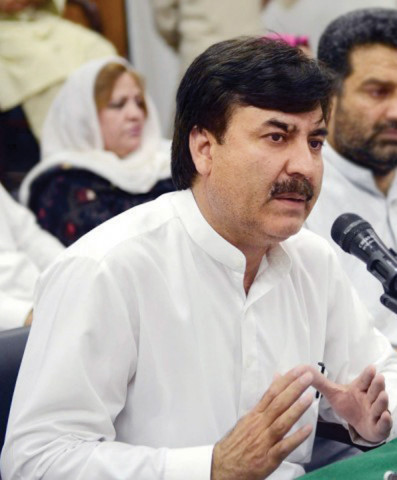In session: Poliovirus, possible travel restrictions take centre stage
Non-payment of municipal employees’ salaries in Lakki Marwat also discussed.

Non-payment of municipal employees’ salaries in Lakki Marwat also discussed
Khyber-Pakhtunkhwa’s (K-P) health minister Shaukat Yousafzai informed the house on Tuesday that polio in the province had indeed become an international issue.
The minister was responding to an attention notice from Pakistan Tehreek-e-Insaf’s lawmaker from Mardan, Jamshed Khan. When he took the floor, Khan said the World Health Organisation (WHO) had declared Peshawar the global hub of polio and that 90% of the virus in Pakistan was genetically linked back to the city. The MPA from Mardan added that the same strain of the virus was also reported to have been found in Afghanistan.
Polio on your passport?
Yousafzai explained if polio cases are not under control by 2018, there is a chance that the country and her citizens would face travel restrictions. Some countries had already started working towards that end, he added.
According to the health minister, the provincial government has launched a Rs22 billion integrated programme to counter polio and eight other paediatric diseases, as well as the infant mortality rate. Yousafzai reiterated polio was a problem in the provincial capital and has also become an international issue after WHO declared Peshawar a global reservoir of the virus. This also forced the government to launch the Sehat ka Insaf programme.
Two committees headed by the K-P chief minister and chief secretary were monitoring the situation, he added. Yousafzai is also a part of the prime minister’s polio monitoring team.
The health minister claimed after WHO’s assessment of the provincial capital, sewage samples were collected from Shaheen Muslim Town three weeks after Sehat ka Insaf was launched. The samples tested negative for polio, he said.
The K-P government has also approved a Shuhada package worth Rs1 million for polio workers who had lost their lives on the job, shared Yousafzai.
According to Yousafzai, polio campaigns still could not be launched in North Waziristan, South Waziristan and Khyber agencies despite the fact that “66 of the 92 polio cases reported last year were from the Federally Administered Tribal Areas (Fata).” However, according to data provided by the WHO and UNICEF, 65 cases of poliovirus were reported from Fata out of a total 93 in the country.
Trying to control polio is an enormous challenge, maintained Yousafzai and asked other parties to cooperate with the government.
Pay up
The Jamiat Ulema-e-Islam-Fazl MPA from Lakki Marwat, Munawar Khan, drew the house’s attention towards the non-payment of municipal employees’ salaries in his district for the last three months. “These employees have been on a hunger strike for three days,” shared Munawar.
Chief Minister (CM) Pervez Khattak responded, saying the provincial government had sanctioned Rs500 million for this once and will not do it again. He directed the secretary of the local government department to meet with tehsil municipal officers to settle this issue.
Minister for Local Government Inayatullah Khan informed the house that in 2009 there were about 9,000 to 10,000 municipal employees across the province, however, this number increased to 27,000 by 2012. The government has regulated employment in the province’s municipal departments and the approval of the local government’s secretary was necessary for every appointment, insisted Inayatullah.
Also presented before the house were the K-P Restriction of Rented Buildings (Security) Ordinance 2014, the K-P Hotels Restriction (Security) Ordinance 2014 and the K-P Tenancy (amendment) bill 2014.
The session was adjourned to Thursday afternoon.
Published in The Express Tribune, March 12th, 2014.













COMMENTS
Comments are moderated and generally will be posted if they are on-topic and not abusive.
For more information, please see our Comments FAQ